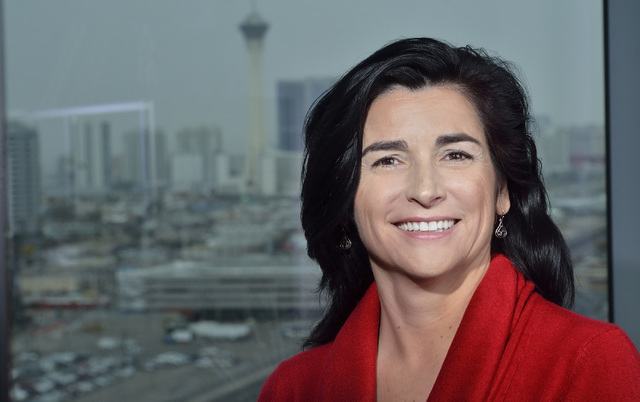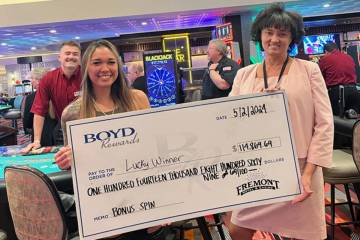Attorney moves West, joins firm with major presence in Nevada
After 10 years as the general counsel for the Onieda Tribe of Indians in Green Bay, Wis., Jennifer Carleton couldn’t see herself performing the same duties on behalf of any other tribe.
The Oniedas had become family.
Instead, Carleton moved West to Las Vegas in 2007, joining the gaming law department of Brownstein Hyatt Farber Schreck, a national law firm with a significant presence in Nevada. A year earlier, Frank Schreck, who is considered one of the deans of Nevada gaming law, merged his firm with Denver-based Brownstein.
Carleton’s first adjustment was transitioning from Indian gaming law to commercial casino gaming law.
“It’s like comparing apples and truck tires,” said Carleton, 44. “A lot of firms I talked with in the Midwest wanted me to do Indian gaming law. Here, they told me I was just going to do corporate gaming work. That was exciting.”
Carleton is entering her eighth year with the firm. During her tenure, she has become one of the few private attorneys in Nevada with an expertise in Indian gaming law.
Many Nevada gaming companies have moved into management agreements with tribal casinos across the nation. Carleton regularly advises the firm’s client on Indian gaming matters.
“I knew I would regret it for the rest of my life if I didn’t try it,” Carleton said about her transition to Las Vegas. “It has wildly exceeded my expectations.”
The Oneida community operates two major casinos in the Green Bay area and several smaller properties. Carleton moved throughout the tribe’s corporate offices, touching all areas of Indian nation legal matters and tribal gaming law.
During her job interview with Schreck and firm shareholder David Arrajj, the discussion focused on the background she gained working for Onieda tribe. The job offer, however, was a foregone conclusion. A lawyer friend intervened and suggested Carleton be offered a position.
“They liked the idea that I had operations experience,” Carleton said. “Clients appreciate when you can offer that type of perspective.”
Question: What was your familiarity with Frank Schreck before coming to Las Vegas?
Answer: I knew who Frank was but I wasn’t prepared for the iconic nature of working with Frank. I came in after the merger. What’s interesting is how the firm is known by one brand, Brownstein. In Las Vegas, however, it will always be known as the Schreck firm.
Question: What types of clients do you work with?
Answer: Some of our clients think of me as the Indian gaming expert and they will call me with specific questions. I mainly work on Nevada gaming corporate law and I’ve also been doing a lot of work on the manufacturing side.
Question: How did you get into Indian gaming law?
Answer: I worked for the tribe in its internship program in the summer after my first year in law school. I spent my time in the tribal court. The next summer I worked for the casino part of the business. The tribe offered me a job after law school but I decided to go to work for a firm in Chicago. After six months, the tribe had another opening and I took it.
I did some tribal gaming law, but I was working mainly on employment law and Indian child welfare law in my first year-and-a-half. The tribe started doing more gaming compact work and I moved over to the gaming side full time. I would spend a few days a week at the casino. I found gaming to be something that lights you up and gets you excited from all the different aspects.
Question: How different is Indian gaming law from commercial gaming law?
Answer: The operations side is the same, but it’s much different from a management and ownership perspective. Here, we represent casino owners. But in Indian country, the tribe has to be an owner. You don’t have shareholder issues, although there might be some institutional investors. The tribes are sovereign nations and make their own laws. A tribal regulatory body licenses all activity. Depending on the language in the compact, the state has a role and the federal government has a role.
Question: Are we seeing a convergence between Indian gaming law and commercial casino law?
Answer: Somewhat. What’s interesting about Nevada is that we have 25 tribes in the state, and only half have gaming compacts. There are a couple tribes near Lake Tahoe, and the Paiutes down here and in Moapa. The gaming is very small, such as a truck stop with a few slot machines. Because there is not a lot of revenue, we don’t get a lot of attorneys specializing in Indian gaming law.
I’ve been with working with (Boyd School of Law) to create an Indian law program. We did a summer clerkship and placed some students with different tribes.
Question: What kind of impact can Indian gaming have on the commercial casino industry?
Answer: Take Internet gaming, for example. When Indian country comes to terms on the subject, maybe if the National Indian Gaming Commission or the National Indian Gaming Association take a position on the issue, that will be a tipping point. You might get more buy-in from U.S. casino operators.
Question: Are you starting to see more women specialize in gaming law?
Answer: There are probably a dozen of us that do this full time for a law firm. It’s not a lot. There are people who do gaming law, but not full time. We’re seeing a lot more women that are becoming general counsels for gaming companies and that’s encouraging. I think we’ll start seeing more women grow the ranks on the private law firm side.
Question: Do you gamble?
Answer: I’ll play a little bit when if we go out to dinner and we have 20 minutes or so. But I don’t do table games. It feels like a lot of work. I need to hit a button and wait for the machine to tell me if I won.
Contact reporter Howard Stutz at hstutz@reviewjournal.com or 702-477-3871. Find on Twitter: @howardstutz
NEVADAN AT WORK
Name: Jennifer Carleton
Occupation: Shareholder, Brownstein Hyatt Farber Schreck
Age: 44
Quotable: "I found gaming to be something that lights you up and gets you excited from all the different aspects."




























